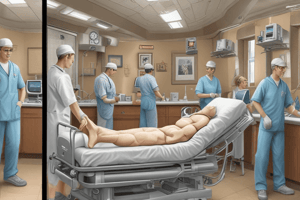Podcast
Questions and Answers
What non-pharmacologic measure should a client with bursitis apply to their shoulder?
What non-pharmacologic measure should a client with bursitis apply to their shoulder?
I will apply moist heat to my shoulder for 20 minutes three times each day.
Which sign most likely indicates that a hip has dislocated after a total hip replacement?
Which sign most likely indicates that a hip has dislocated after a total hip replacement?
- Shortening of the affected leg (correct)
- Increasing pain (correct)
- Deformity (correct)
- Loss of function to the extremity (correct)
What crutch-walking gait should a client use when ambulating without weight bearing on the affected leg?
What crutch-walking gait should a client use when ambulating without weight bearing on the affected leg?
3 point gait
What sign should alert the nurse to impending organ failure in a client with compartment syndrome?
What sign should alert the nurse to impending organ failure in a client with compartment syndrome?
Which statements should be included when teaching a client about osteoporosis? (Select all that apply)
Which statements should be included when teaching a client about osteoporosis? (Select all that apply)
Which exercise should the nurse advise the client to avoid after a lumbar laminectomy?
Which exercise should the nurse advise the client to avoid after a lumbar laminectomy?
What is the purpose of a Pearson attachment on the traction setup?
What is the purpose of a Pearson attachment on the traction setup?
In which position should the operated leg be placed when a client is lying on the non-operative side after a total hip replacement?
In which position should the operated leg be placed when a client is lying on the non-operative side after a total hip replacement?
What adverse effects should the nurse instruct a client taking vitamin D supplements to report?
What adverse effects should the nurse instruct a client taking vitamin D supplements to report?
Will a client diagnosed with osteoarthritis notice deformities in his hands and fingers?
Will a client diagnosed with osteoarthritis notice deformities in his hands and fingers?
What information should be included when developing a teaching plan for a client prescribed acetaminophen for muscle pain? (Select all that apply)
What information should be included when developing a teaching plan for a client prescribed acetaminophen for muscle pain? (Select all that apply)
What exercises will best prepare a client with an above-the-knee amputation for using crutches?
What exercises will best prepare a client with an above-the-knee amputation for using crutches?
What is the most significant risk factor for primary osteoarthritis?
What is the most significant risk factor for primary osteoarthritis?
What is a priority goal for a client with rheumatoid arthritis?
What is a priority goal for a client with rheumatoid arthritis?
Which nursing actions are essential when discharging a client following a hip replacement due to degenerative arthritis? (Select all that apply)
Which nursing actions are essential when discharging a client following a hip replacement due to degenerative arthritis? (Select all that apply)
After myelography using metrizamide, in which position should the client be placed?
After myelography using metrizamide, in which position should the client be placed?
Flashcards are hidden until you start studying
Study Notes
Bursitis Management
- Application of moist heat for 20 minutes, three times daily, is an effective non-pharmacologic measure for managing subacromial bursitis.
Total Hip Replacement Care
- Signs of potential hip dislocation post-surgery include shortening of the affected leg, increased pain, loss of function, and deformity.
- Leg abduction is a key preventive measure against dislocation.
Crutch Walking Techniques
- A 3-point gait is used by clients ambulating without weight-bearing on a fractured leg, promoting mobility while protecting the injured area.
Compartment Syndrome Indicators
- Dark, scanty urine may indicate impending renal failure due to myoglobin release from compartment syndrome affecting kidney function.
Osteoporosis Education
- Osteoporosis is common post-menopause in women, characterized by decreased bone density and an increased risk of pain and injury.
Post-Lumbar Laminectomy Precautions
- After a lumbar laminectomy, clients should avoid performing sit-ups to prevent strain on the back.
Traction Equipment Purpose
- A Pearson attachment provides support for the lower portion of the leg during traction therapy.
Positioning after Hip Replacement
- When lying on the nonoperative side, the operated leg should be positioned in abduction and extension for optimal recovery.
Vitamin D Supplementation in Osteomalacia
- Clients taking vitamin D supplements should report gastrointestinal upset or a metallic taste, as these are early signs of vitamin D toxicity.
Osteoarthritis vs. Rheumatoid Arthritis
- Hand deformities, such as those seen in rheumatoid arthritis, differ from osteoarthritis, which primarily presents with pain during activity and specific node formations (Heberden's and Bouchard's nodes).
Teaching on Acetaminophen Use
- Acetaminophen is safe for individuals allergic to aspirin, does not cause platelet aggregation, and typically has minimal gastrointestinal side effects.
Crutch Readiness Exercises
- Strengthening triceps through stretching exercises is essential for clients using crutches, especially following an above-the-knee amputation.
Osteoarthritis Risk Factors
- Age is the most significant risk factor for primary osteoarthritis, surpassing obesity as a concern.
Priorities for Rheumatoid Arthritis Management
- Adaptive equipment is crucial for clients with rheumatoid arthritis to cope with potential hand deformities.
Transitional Rehabilitation After Hip Replacement
- Essential nursing actions include avoiding hip flexion exercises, placing two pillows between knees, and equipping bathrooms with raised toilet seats to ensure comfort and safety.
Post-Myelography Care Positioning
- Following a myelography using a water-soluble contrast dye, the head of the bed should be elevated to 45 degrees to slow the upward dispersion of the dye. For air contrast, clients should be placed in a supine position with feet elevated in Trendelenburg.
Studying That Suits You
Use AI to generate personalized quizzes and flashcards to suit your learning preferences.




